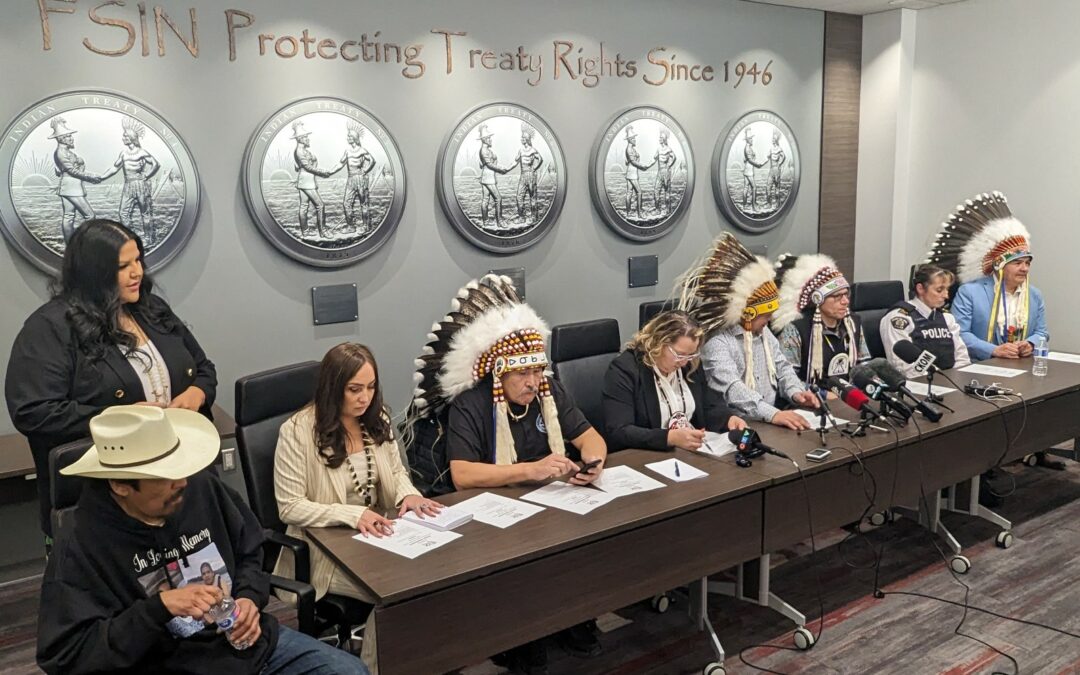First Nations leaders are vowing to move forward following the James Smith Cree Nation mass stabbing inquest and they say they will not leave vulnerable communities behind.
A Coroner’s Inquest took place in Melfort the past three weeks examining the circumstances around the tragedy. A total of 29 recommendations handed out to help prevent similar tragedies in the future.
Leaders from James Smith Cree Nation along with other First Nations leaders, and some victim’s family members, addressed the inquest Thursday afternoon at a press conference at the FSIN head office in Saskatoon.
James Smith Cree Nation Chief Wally Burns, AFN National Chief Cindy Woodhouse, FSIN Chief Bobby Cameron, PAGC Grand Chief Brian Hardlotte were among those who spoke at the press conference.
The leaders addressed the need for the recommendations to be implemented fully and quickly and for investments and funding into Indigenous led policing and justice initiatives.
The leaders also called on the federal and provincial governments to provide funding for these solutions.
“I hope these recommendations are taken seriously and we are not back where we are a year from now,” said AFN National Chief Cindy Woodhouse.
“We have a lot of work ahead of us and we have to move forward,” said James Smith Chief Wally Burns.
“We are going to fight for justice and make sure this doesn’t happen again,” said FSIN Vice-Chief Aly Bear. “Because this was preventable.”
Vice-Chief Burns also spoke on the legacy of colonialism and residential schools.
“Everyone talks about reconciliation, but where is reconciliation,” she said. “This is a direct affect of residential schools.”
Saskatchewan RCMP Commissioner Rhonda Blackmore echoed the calls for more funding.
“Nobody wants this tragedy, the win comes when there is no tragedy,” said Blackmore. “We want proactive policing and we need funding to do that.”
“As Indigenous people move forward in a good way, we (the RCMP) want to be a part of that,” Blackmore added when speaking on the need for more Indigenous people as members of the RCMP.
James Smith Chief speaks on frustrations with slow process on First Nations policing
In the weeks and months following the mass stabbing tragedy there were renewed and heightened calls for First Nations led policing in Canada.
Wally Burns says he is frustrated that over a year since those conversations there hasn’t been very little movement on that front.
“I’m getting frustrated because we are spinning our wheels over and over again, but nothing is happening,” said Burns.
According to Burns, there continues to be a mismatch on funding between First Nations and the federal government over First Nations policing.
Victim family member says more recommendations could have been made
The 29 recommendations handed out by the presiding coroner and the inquest jury were made toward Correctional Services Canada, the RCMP, and James Smith Cree Nation itself.
One organization left out of the recommendations, who Chelsea Stonestand thinks should have been included, is the Parole Board of Canada.
Stonestand, who represented the family of Gregory and Bonnie Burns at the inquest, says only 7 Indigenous people sit on the parole board – a board that consists of up to 80 members. She says she would like to see that number increased.
Stonestand also felt the inquest was too focused on Covid-19 measures at the time rather than speaking on addictions and institutions.
“Isn’t this the time to talk about these things, if not here then when… then where?” she said.
Possible calls for a national inquiry
Heading into Thursday’s conference there were rumblings about a possible call from First Nation leaders for a national inquiry into the mass stabbing.
During the addresses at the press conference, none of the leaders spoke on a possible inquiry on a national level instead speaking on hopes the coroner’s inquest recommendations would be implemented and that there could be faster movement on First Nations led policing.
AFN National Chief Cinty Woodhouse was asked about a possible national inquiry and she says they will need to examine the inquest and monitor the recommendations before calling for anything on a national level.
As for James Smith Cree Nation Chief Wally Burns he says a national inquiry would be a welcome sight.
“For myself that’s the way I want to see it and it should happen that way,” he said. “Right now nothing is working and it had to take a mass stabbing in our community to echo something like this.”
If approved, a national inquiry could take several years to put in place.
(Top Photo – First Nation leaders gather for a press conference in Saskatoon a day after the conclusion of the coroner’s inquest into the stabbing rampage on James Smith Cree Nation and the community of Weldon. Photo by Joel Willick.)
